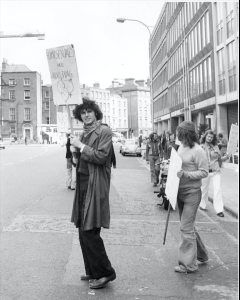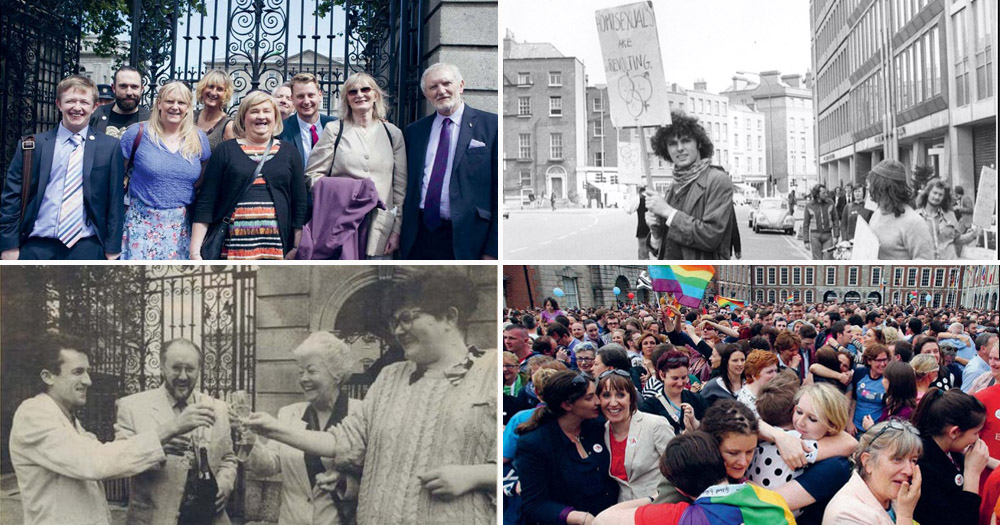The course of history is rarely a ‘straight’ forward timeline and this is especially true of the fight for Irish LGBTQ+ rights. Inherently the struggle of lesbians, Trans people and other sexual minorities have become intrinsically enmeshed within the push for gay rights. Whilst fighting for the rights of individual minorities, in so many ways, these campaigns have often bolstered the trajectory of gay emancipation.
To mark LGBTQ+ History Month, over the coming weeks, we’ll be taking a look at some of the lesser-remembered/acknowledged events within Irish LGBTQ+ history and how they influenced some of the bigger moments.
To put these in context though, we do have to start by understanding the more often celebrated milestones and the impact that they have had on Irish society.
1973: The Sexual Liberation Movement
In October 1973, ten men and women met in a small room in Trinity College, Dublin. That evening they formed the Sexual Liberation Movement (SLM). The founding members were Peter Bradley, Irene Brady, Mary Dorcey, Michael Kerrigan, Edmund Lynch, Hugo McManus, Gerry McNamara, Margaret McWilliams, David Norris, and Ruth Riddick.

Many members of the group would become leading figures within both the LGBTQ+ and the women’s rights movements. The SLM would eventually become Trinity’s Gay Soc, the first LGBTQ+ society to be recognised by a state university. The group also led to some of the members establishing the Irish Gay Rights Movement (IGRM), which would become an integral movement in challenging Irish legislation and developing social support networks.
1977: David Norris v. The Attorney General
David Norris began his decade long legal battle for decriminalisation. The case was against the Attorney General claimed that the criminalisation of homosexual acts was in breach of his right to privacy. After losing the case in the High Court, Norris brought the case before the Supreme Court in 1983, where he was again unsuccessful.
He subsequently took the Norris v. Ireland case to the European Court of Human Rights. In 1988 the court found in favour of Norris, declaring that the Offences Against the Person Act, 1861 and the later Criminal Law Amendment Act, 1885 were in breach of the person’s right to privacy by allowing homosexuality to remain a criminal act.
G.C.N. is a great way for oldies like me to keep in touch with the gay community. Please support the https://t.co/xuhFYhPem3 and of course the hastag #GCN30 pic.twitter.com/IH1t3TVXWp
— Senator David Norris (@SenDavidNorris) May 8, 2018
Norris’s senior counsel for the case was Mary Robinson who would go on to become the first female president of Ireland in 1990. She would later make history again, by becoming the first Irish president to invite delegates from the LGBTQ+ community into Áras an Uachtaráin.
1983: The Fariview Park Protest
Often mistakenly referred to as Ireland’s first Pride march, the 1983 protest from Liberty Hall to Fairview Park is rightly seen as one of the seminal moments in the Irish LGBTQ+ rights movement.
Following the murder of Declan Flynn, a gay man who was beaten to death by a gang of four men and one youth in Fairview Park in September 1982, LGBTQ+ rights organisations gathered outside Liberty Hall to demonstrate the verdict. Although the attackers had been found guilty of manslaughter, they were awarded suspended sentences.
The march was supported by a number of women’s rights groups as well as trade unions and other civil liberties organisations. The march was attended by approximately 400 people calling for an end to violence against gays and women. It had a profound and lasting effect on Ireland’s civil rights landscape. By consolidating the fight and struggles of several minorities, it garnered solidarity from wider society and amplified the voices of those marginalised.
1985 – Gay Health Action
Gay Health Action (GHA) was formed in January 1985 as a national response to the AIDS epidemic. Operating out of Dublin and Cork, they were Ireland’s first AIDS activist organisation. They provided the most accurate and up-to-date health information with a non-judgemental and often explicit approach.
The main focus of GHA’s campaigns was education and prevention. They actively targeted gay and bisexual men both through their messaging but also by going directly to bars, nightclubs and meeting places. Although the organisation was established to support the LGBTQ+ community, in the absence of a state response, they quickly became the primary source of accurate information and advice for anybody at risk of contracting HIV or AIDS. Despite ongoing funding and staffing difficulties, the group remained active until 1990.
1993: The decriminalisation of homosexuality
As a result of the European Court of Human Rights verdict in the Norris v. Ireland case, the Irish government were forced to review the legislation governing sexual acts between men. The Offences Against the Person Act, 1861 which criminalised the act of buggery, and the later Criminal Law Amendment Act, 1885 which criminalised “gross indecency”, had been decriminalised in the UK as early as 1967, however they had remained on the Irish statute books since before the founding of the State.
#GCNmag Issue 54: Published in June 1993, the people celebrating the decriminalisation of homosexuality in front of the Dáil are, left to right, Kieran Rose and Chris Robson of GLEN, Phil Moore from Parents Support and GCN News Editor and GLEN co-chair, Suzy Byrne. #GCN30 pic.twitter.com/nKJMU4hA1C
— Gay Community News (@GCNmag) March 10, 2018
Although the Norris v. Ireland verdict had been passed down in 1988, it took the government a further five years to review the legislation and remove the Acts. Whilst this took place nearly three decades after the UK, in contrast, Ireland immediately brought the age of consent in line with that of heterosexual consent and imposed no further restrictions.
2015: The Marriage Referendum
1993 to 2015 seems a MASSIVE jump but this is often the way Irish LGBTQ+ rights are perceived. However, there were numerous events, organisations and individuals that changed the minds and hearts of the people of Ireland as you will see in the coming articles, but the impact of the 2015 Marriage Referendum cannot be overlooked.
Five years ago today. I voted Yes, with these two alongside me, before dropping them to school. Then I drove to work, sobbing as I heard all the #HometoVote stories flood in. I remember himself telling me to find a quiet room to go lie down in for a while! ? #MarRefMemories pic.twitter.com/hw5ZwnDacf
— Colm O'Gorman ?️⚧️?️??? (@Colmogorman) May 22, 2020
Whilst civil partnership had been introduced in 2011, there were over 200 differences between civil partnership and civil marriage and getting the people of Ireland to realise this was no easy task. The campaign saw an overwhelming 62% of the Irish population vote in favour of same-sex marriage, making Ireland the first country in history to allow same-sex marriage through popular vote.
2015: The Gender Recognition Act
2015 also saw Ireland introduce the Gender Recognition Act, allowing anybody over the age of 18 to self-declare their gender identity. Ireland was only the fourth country in the World to specifically introduce legislation based on self-determination, removing all medical criteria from the legal recognition process. The act also became the first in Ireland to include a review clause, allowing for amendments to be made based on a consultation process.
Thanks to all who came, spoke, lobbied, supported & helped in some way to get the Gender Recognition (Amendment) Bill passed today. #grb17 pic.twitter.com/rrzCjhhsU9
— TENI (@TENI_Tweets) May 10, 2017
As worthy and notable as all of these events are in the telling of Irish LGBTQ+ history, they cannot begin to represent the varied challenges that the community has faced throughout the nearly 50 years of modern-day LGBTQ+ activism. There have been incredible achievements made in women’s rights and Trans rights. And there have been significant and vital advancements in the areas of sexual health and we will be highlighting these in the coming articles.
© 2022 GCN (Gay Community News). All rights reserved.
Support GCN
GCN is a free, vital resource for Ireland’s LGBTQ+ community since 1988.
GCN is a trading name of National LGBT Federation CLG, a registered charity - Charity Number: 20034580.
GCN relies on the generous support of the community and allies to sustain the crucial work that we do. Producing GCN is costly, and, in an industry which has been hugely impacted by rising costs, we need your support to help sustain and grow this vital resource.
Supporting GCN for as little as €1.99 per month will help us continue our work as Ireland’s free, independent LGBTQ+ media.
